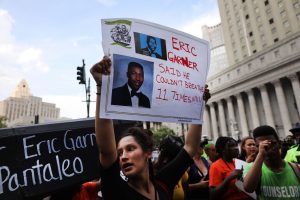Cedric L. Alexander served as a member of President Barack Obama’s Task Force on 21st Century Policing and is former director of public safety for DeKalb County, Ga.
As lawmakers in Congress negotiate their long-awaited police reform bill, Democrats are sticking firm to their conviction that the legislation must include some type of reform of qualified immunity — the legal protections that make suing individual police officers for misconduct nearly impossible. For many on the left, that raises an important question: To what extent should they be willing to compromise on reforming the law?
It’s the wrong question to ask. As a 40-year veteran of law enforcement, from sheriff’s deputy to chief and director of public safety, I firmly believe that nothing federal, state or local governments do about qualified immunity will significantly reduce or increase the incidence of unjustified deadly force by police. Real reform requires us to go much deeper than tweaking tort rules.
I do not wish to dismiss the debate about qualified immunity. Indeed, the arguments against it are compelling. Some say it puts the officer above the law, at least civil law, by denying the families of those unjustly killed by the police their constitutional right to seek redress of grievance.
This is a legitimate point, but so, too, are arguments that immunity should be available when officers are called to account for split-second life-or-death decisions. Concern over financial liability should not be permitted to cloud an officer’s judgment at a critical moment.
And financial liability is a real concern. I am certain that the most committed supporters of the doctrine remain the majority of cities and other local governments that see the qualified immunity defense as an urgent budgetary matter. A report published early this year revealed that, over 10 years, New York City, Chicago and Los Angeles spent a combined total of $2.5 billion to settle lawsuits against police.
Put it this way: Taxpayers cannot afford the mounting direct monetary costs of the abuse of policing authority. Realizing this, city and other local governments have embraced qualified immunity not only as a means of defeating liability lawsuits, but also to manage liability itself.
A far better strategy would be to eliminate the risk of ending up in court. Just imagine what local and state governments could accomplish if they were to invest the money they spend on misconduct lawsuits on making policing more humane and more effective. They could better train officers in de-escalation tactics to reduce the likelihood of lethal violence. And they could train officers to use effective alternatives to lethal force and to deal with mentally disturbed people safely. Doing so would improve the public perception that the police have earned their authority from the community and that they use it to serve and protect, not to punish. Officers and agencies need to learn and embrace procedural justice — the idea that the processes by which police officers resolve disputes and police agencies allocate resources are fundamentally fair.
As important as training is, even more critical is instituting more selective recruitment standards. Police agencies must ensure that they attract the best, the brightest and only those whose values are aligned with the values of our democracy. To attract such applicants, they need to make policing a genuinely viable long-term professional career, with salaries, benefits and working conditions competitive with the most coveted careers in the private sector.
Finally, we must think beyond mere “reform” and instead tackle bold redesign. This can begin by focusing the role of the police more narrowly. Today, officers are called upon to be everything to everyone — not only to fight violent crime but also to care for the socially dispossessed, the mentally ill and people with addiction disorders. They are called on to direct traffic and to ticket those who have done nothing more than commit traffic offenses. It makes no sense to send armed men and women into situations that require social workers, paramedics, or traffic and parking enforcement professionals. Policing should be regarded as only one dimension of public safety.
We need reforms that work to eliminate police abuse, not change how police agencies fight it in court. That’s why debates in Washington, D.C., feel so hollow: With or without qualified immunity reform, our nation can no longer afford — financially or morally — police misconduct.




